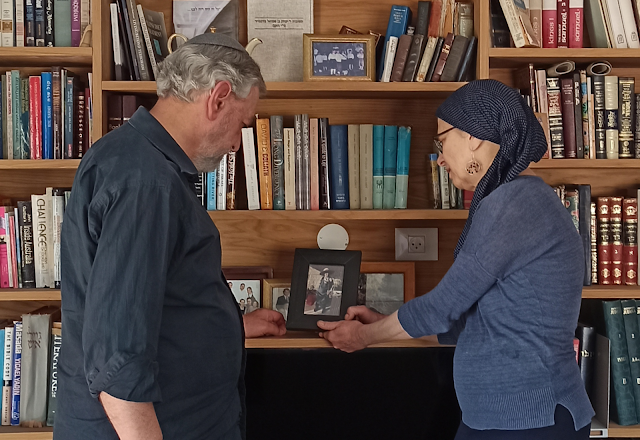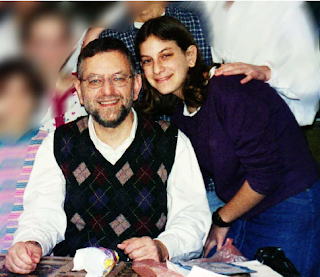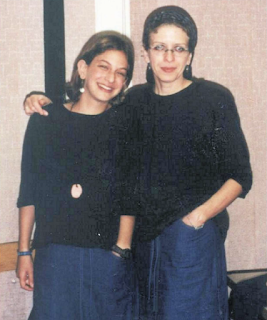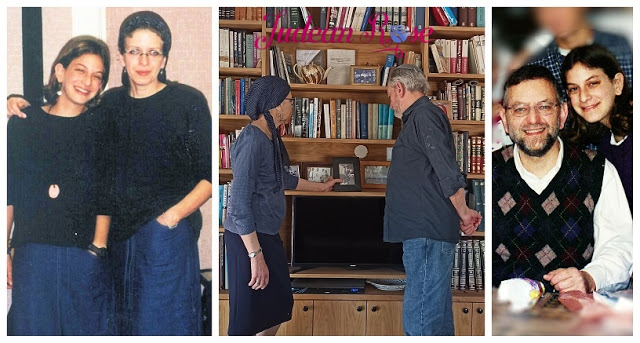Malki Roth, 15, was murdered for eating pizza while Jewish in Jerusalem. That she was with her best friend, also murdered for eating pizza while Jewish in Jerusalem, is of little comfort, though the two are buried next to each other, together in death as they were in life. But what grabs you by the throat and doesn’t let you go is that the mastermind of the Sbarro Restaurant Massacre, Ahlam Tamimi, lives free and clear in Jordan, a celebrity to her people.
Why a celebrity? It’s simple. Ahlam Tamimi is celebrated in Jordan for causing Jewish blood to be spilled. In particular, the blood of Jewish children, which apparently brought her great (and very public) delight.
Now if you are an American, you should care about this because Malki Roth was an American citizen. The United States has an extradition treaty with Jordan. But the United States has done next to nothing to seek justice for one of her own. Which is shameful.
Jordan gets a lot of money from the United States, so it would seem to be the easiest and most sensible thing in the world to accomplish the extradition of Tamimi, a wanted terrorist. Cut the money pipeline and they, Jordan, will hand Tamimi over quick enough.
But that hasn’t happened.
Why not? And how do Malki’s parents, Arnold and Frimet Roth, live with that reality and betrayal, even as their daughter’s blood cries out from the ground for justice?
 |
| Arnold and Frimet Roth gaze at a photo of their daughter Malki, HY”D. |
Arnold Roth was interviewed in this space one year ago in an effort to raise awareness of this story, this travesty of justice. But twelve months on, the extradition has still not occurred. Tamimi has
not been put on trial. She is
still free, still celebrated as a hero in Jordan. And Malki Roth’s blood still cries out from the ground.
It seems appropriate, one year on, to take stock and ask: What has changed in the course of one year? Is there any hope, any progress at all? I spoke to Arnold to learn more:
Varda Epstein: In our interview of a year ago, you mentioned some concrete achievements in your efforts to persuade the US to increase the pressure on Jordan to extradite your daughter’s murderer, Ahlam Tamimi. Tamimi had been charged and a reward for her capture issued. But there were unnamed officials who seemed to be blocking this process. Can you tell us more about this? Has anything changed, at least on this score?
Arnold Roth: A terrific question. Let’s look first at what hasn’t changed.
A
major news organization recently called fugitive bomber Ahlam Tamimi “
the most wanted woman in the world”. It wasn’t meant as a compliment. But it’s also not clear what it really does mean. There are 28 people on the
FBI Most Wanted Terrorists list as of today. Of these terrorists, 26 are men. Tamimi is one of the only two female terrorists on this list.
But it would be a stretch to say she’s living the life of someone on the run. Tamimi lives with her husband/cousin in a fancy apartment in Jordan’s capital. That’s where she was when you and I spoke about her last June. And that’s where she is now. She’s still free as a bird, unrestricted in her movements, frequently quoted and published in the Arabic media. Tamimi, above all, continues to be a figure of malignant influence, a devotee of Islamism in the most violent sense, a woman who uses every accessible part of the media to keep pumping out lethal hatred often, widely, and to a hugely appreciative audience.
Tamimi Has Never Been in Hiding
And contrary to its own carefully manicured public relations, the Hashemite Kingdom of Jordan, an ally of Western governments that has one of the world’s most restricted and tightly controlled media strategies, continues to be perfectly fine with all of this.
Tamimi was not in hiding when we spoke last time and she’s not in hiding today. She has, in fact, never been in hiding—not even for a single day since she returned home to Jordan in 2011 after several years in an Israeli prison cell. Jordan is where she was born and educated, and Jordan is where Tamimi still lives today, out in the open, though she was supposed to spend the rest of her life behind bars.
Sentenced by a judicial panel to 16 terms of life imprisonment after confessing to her role in the Jerusalem Sbarro pizzeria massacre, Tamimi got her freedom back by way of the Shalit Deal. In this “exchange,” Israel released 1,027 terrorists—more than half of them killers—for a soldier held hostage for more than five years by Hamas terrorists in conditions that, according to lawyers, constitute a war crime.
Tamimi’s Life is Public
Photos of the Tamimi apartment in Amman, even more than when we spoke last year, are still easily found on social media. The Tamimi home has been photographed from the inside, from the outside, from the terrace looking up and looking down. The trajectory of Tamimi’s life and career are public information. Her
wedding got live TV coverage. She earned a master’s degree in journalism the same week your first interview with me was published, and this too, made it into the
news. Everything Tamimi does is eagerly scrutinized by her adoring Jordanian public.
Should this trouble thoughtful people? Yes. Because the U.S. government announced a $5 million reward on her head in January of 2018. But it’s obvious that the Tamimi reward doesn’t work the way such rewards normally do. No one needs to be financially incentivized to hand over the details of where Tamimi is when every relevant person already knows her location.
![]() |
| If the reward was never intended to apply inside Jordan, why is this never stated publicly and how can U.S. officials claim relentless efforts to bring Ahlam Tamimi to U.S. justice? |
High-level U.S. officials obviously know this particular reward was never intended to apply inside Jordan, leaving inquiring minds to wonder (a) how it is that this is never stated publicly, and (b) what goes through the minds of officials as they make eloquent speeches or issue media releases about Tamimi and their “relentless” efforts to bring her to U.S. justice?
At a certain point, those well-composed, emphatically-phrased official statements coupled with the refusal of a long line of U.S. diplomats and other officials to engage with me and my wife leave us—picking my words cautiously—troubled.
The regime of King Abdullah II, meanwhile, is still fully engaged in illicitly blocking U.S. law enforcement’s efforts to take Tamimi into custody. Amman’s willingness to stare down the United States, its most important ally and the source of more foreign aid that Jordan gets from anyone else, remains as it was when you and I last spoke, something deeply puzzling.
Prominent Officials Heap Praise on Abdullah
Deepening this puzzle further, there’s no shortage of U.S. institutions, politicians and prominent Jewish community figures who persist in heaping generous praise upon Abdullah’s majestic head.
The Good News
So what’s changed?
First: A high-ranking official, the kingdom’s foreign minister, let himself be provoked in November 2019 to break Jordan’s protracted official silence on Tamimi. We blogged about it here: “
13-Nov-19: Thank you, Mr Foreign Minister”. Our gratitude to Mr Ajman Safadi was sincere. His statement means that Jordan’s disgraceful, almost incomprehensible policy of standing firmly in solidarity with the engineer of the Sbarro pizzeria massacre is now a matter of policy that diplomatic double-talk simply cannot disguise.
Next: The United States, after a long period of avoidance and ambiguity, came out with its own brief but clear statement (as we wrote
here) in November 2019:
In 2018, Jordan continued to cite a court ruling that its constitution forbids the extradition of Jordanian nationals. The United States regards the extradition treaty as valid.
Until those words in italics appeared in an official U.S. government publication, the matter was arguably unclear. Now it’s not. That’s very important.
Important Warning Letter
Another step forward: On April 30, 2020, a small group of U.S. lawmakers sent off a letter to Jordan’s ambassador to Washington. In their letter, the lawmakers politely asked highly relevant questions that go to the legal theory behind the March 2017 decision of Jordan’s Court of Cassation to invalidate the 1995 Jordan/US treaty.
The lawmakers’ letter also touched on a crucially important development that, again, has gotten almost no media attention. Here’s the short version:
In December 2019, President Trump signed into law a powerful sanction that, while it does not mention Jordan by name, applies to a beneficiary of US foreign aid (Jordan is the third largest recipient of such aid), has an extradition treaty with the US (as Jordan does, though it denies this fact), and is in breach (as Jordan surely is, and the State Department now at last agrees) of its obligations under that treaty.
The sanction, which the Secretary of State can waive, means that in such circumstances foreign aid to the beneficiary, ceases.
Jordanian Public Opinion Ignited
Jordan’s reaction to the letter from these members of Congress is worth understanding. Impassioned lectures from outside Jordan about terrorists and Islamism, justice and core values and dead children blown up in a pizzeria were easily ignored in Amman. But when the story turned to money, public opinion was ignited. Jordan’s media was incensed by an all-too-credible threat that the U.S. might stop shoveling cash into the Jordanian treasury.
So that’s the most substantive change: that finally, via baby steps, the Jordanian leadership has been forced to think about acknowledging the cost of the Jordanian public’s adoration of a child-killing bomber living in its midst as a celebrity.
 |
| Arnold Roth with Malki |
 |
| Frimet Roth and Malki |
Varda Epstein: Am I correct in thinking that there has been more coverage of your efforts to have Tamimi extradited in recent months? Why is the media willing to cover this story now, when it was mostly silent until now?
Arnold Roth: Media coverage, or more importantly its absence, is a cause of considerable ongoing embitterment for us. The exceptions are, I am pleased to say, significant but they don’t change the sense we have that for the mainstream news industry, we and our cause are untouchable.
When I tell people we feel like the town lepers, I don’t feel like I am exaggerating very much.





Leave a Reply